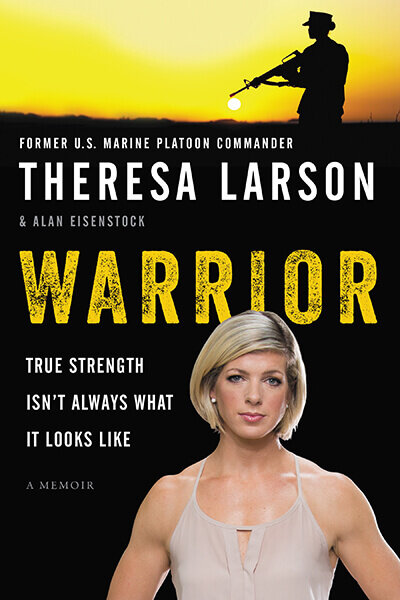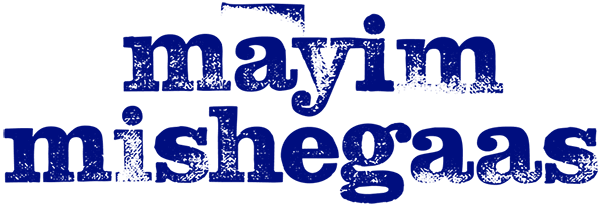
For National Women’s Health Week, we’ve highlighted the importance of being aware of your body and its needs. I wanted to close out the week with an interview I did with Dr. Theresa Larson about her book, Warrior: A Memoir (co-authored with Alan Eisenstock).
Warrior follows Theresa’s life from the loss of her mother when she was 10 to her journey as a softball player on scholarship in college to a path of fitness and wellness – including being a competitive fitness model – that ultimately led to a growing obsession with food. After struggling with the pressures of trying to be everything to everyone, her eating disorder progressed to full-blown bulimia. Even as she entered the Marines and advanced to become a Marine lieutenant on tour in Iraq, she struggled with her eating disorder until she discovered the strength needed to get help.
Warrior is an interesting and enjoyable read, and the journey Theresa takes us on has so many elements that so many of us can relate to: having responsibility in your family beyond your years, dealing with loss, the struggle to be perfect, falling prey to the pressure to look and act a certain way as a female, and ultimately, finding the maturity that teaches you how to truly have control over your own life.
I highly recommend that you read Warrior and check out Theresa’s website. It has a lot of great resources and you will learn more about what Teresa has decided to do with her life now that she is healthy, inside and out. Her story will inspire you; check it out! – MB
Mayim Bialik: So many of our readers may be hearing about you or hearing about the book for the first time. Can you talk a little bit about how you got the idea not only to write a book, but to write this book about something so incredibly personal?
Theresa Larson: I wanted to write this book like 10 years ago when I was sitting in my [Marines] commander’s office, and he was basically telling me I was a disappointment. And I’m sitting there thinking, “Nobody understands this issue of having an eating disorder” – including myself really- but I was in a job environment where it was primarily male, and they didn’t understand this and I worked my ass off to get where I was and now that I’m standing there needing help, the Marine Corps is going to abandon me. So the Marine Corps didn’t understand, nor did the military in general and society too, but I needed to get back on my feet.
Three years ago I was finally in a place where I could start sharing what happened to me. I was coaching some wounded veterans here in Del Mar and they would share their injuries with me and so I started to share about what happened with me. I had struggled with anxiety and depression and an eating disorder and I was a little embarrassed to share initially and they welcomed my story with open arms. Especially in my work, people come to me with physical injuries and I would notice that there are emotional injuries there too and people don’t like to talk about those; I call them “invisible wounds.”
I’d been doing some outreach for the National Eating Disorder Association which helped me find care when I got out of the military and also while I was in the military and they invited me to give a talk in DC. And at that talk I met [future Warrior co-author] Alan Eisenstock, who after hearing me speak said to me, “We need to write your story. People will benefit from hearing your story and I want to help you write it.” And I was like, “Okay (haha)… Who are you?!” It took me a few months to really sit down with him and talk with him and found out what his motive was.
MB: Was it hard to think of writing something that kind of was motivated by the military’s lack of ability to help you?
TL: It actually does not. The military is a small entity in society so really they still don’t understand PTSD (Post Traumatic Stress Disorder). It’s such a large syndrome and mystery. So I didn’t want to do this book as a way to blame or point fingers… I really wanted to say: hey, I know I chose to grow and I know other people have that ability too, but I want people to know they are not alone. And in order for me to save myself, I had to get help. In order for me to save others from getting injured, I had to get help.
And I wanted to expose that getting help is a sign of strength. Actually facing your inner demons/ problems face-on is a sign of strength and not weakness, and so that’s the angle I wanted to come at. It’s like, I have come to a place where I’m healing and it actually helped me even more – writing the book – but I wanted to really show people that.
MB: You go through a very distinctive, very concrete progression from “I can handle this [eating disorder], I can handle this, I’ve got this, I don’t need anybody’s help, of course I can master this; if I can master everything else, why shouldn’t I be able to master this?” And then there comes this kind of breaking point where you sort of come to this realization that the truest sign of strength is to not keep trying to do it on your own. And it happened so slowly through your story that I feel like the reader is almost not caught off guard when you finally come to it, but I think that’s one of the most critical parts of your story: the decision to not handle it on your own but to show that the true heroism comes from asking for help and being able to kind of step out of that race you were in with yourself.
TL: So that was a very key thing that I wanted to get across: sticking up for yourself even if its uncomfortable. There were many times in my life I had to stick up for myself. And also, I’ve pushed myself pretty hard and I know people can relate to that— being driven and wanting to put on this face like “everything’s okay, I’m cool, I got this.” And people always looked at me physically and said, “You’re so strong, you’re so tall, you’re so confident-looking,” but on the inside I was beating myself up. And so I’m most proud of the fact of facing why am I being so cruel to myself in asking for help? Just like I ask a coach to watch my movement and I work with a therapist, I’m so open to asking for help now because in the Marine Corps it was almost ingrained in my head that asking for help is weakness; like people look at you as weak if you do that; you need to know what you’re doing and if you don’t, you need to act the part.
MB: Another thing wanted you to talk about was, in this book, you kind of see the evolution of a variety of eating disorders that eventually culminates with bulimia. But there really is a “ramping-up,” and I’m wondering if in retrospect you see that there were points at which it shifted or where, if there had been help available, it might have taken a different course?
TL: There was a definite ramping up of it. I mean in high school, just playing sports and being noticed and finally going to college and being away from my father and being able to eat what I wanted and finding the Body for Life program and feeling like “I’m gonna totally win this!” and like it just seemed like everything I touched, I did well at it;I got exposure and it kept fueling my ego, but I knew I had an issue. I knew I had these up and down mood swings, this eating pattern of bingeing basically one day a week and then eating really clean the rest of the week. I knew that wasn’t healthy but I really didn’t know what to do about it because I felt like, “Well, people are still complimenting me so…”
MB: Well that’s what I was going to say, when you’re still getting all those strokes, it’s hard to stop. So even if you know you have a problem, if you’re getting so much that you perceive as good from it, it’s very hard to stop, especially when you’re young.
As an actor, we’re a lot like athletes in that we kind of have a job that is determined very much on our ability to please other people with what our bodies can do and how we look. And I don’t think it’s as true for male actors but for female actors I feel like it’s getting worse and worse. I got divorced about four years ago and after I got divorced, I was literally eating the same as always but I guess the stress of divorce got me to the skinniest that I had ever been as an adult. And the amount of compliments and attention that I would get was overwhelming. I’m not saying that I was unhealthily skinny, but when I look at pictures, my head looks too big for my body, like I had lost my curves to some extent. I didn’t look like me anymore. But it’s so hard to not want to keep doing the things that give us those strokes because part of it is how we’re conditioned, I think, as women and part of it is just what our culture thrives on.
TL: When you ask if there was a time when I could have stopped…well, I think on paper, sure, yeah. There were definitely points like in college I could have stopped, or maybe in high school I could have stopped…I didn’t really know myself. I didn’t really love myself unless I performed and that’s all I knew, so when I did get help, it was almost like because I’m still doing well and no one really notices and I’m still at the top of my game, I’ll think about it, [about] stopping the behaviors.
And I felt like in my 20-year-old brain or teenage brain that my life was fine because I was getting the attention I wanted and so it stems back to I think when we’re with our kids, who are you out outside of what you do? Like if I were ever to work with parents and kids who excel at something, I’d want to say, “Your kids are great athletes and great students and they’re smart, but who are they? What do they like to do outside of that sport? Do you ever ask them what they love about themselves? Like have you ever sat down with them and done some self-love time?” Whatever that may be; for me it’s reading, for me it can be meditating, for me it’s mobilizing my body, and thinking about what my body can do versus what I look like. So instead of saying to children, ”Why didn’t you practice today? Why don’t you do your homework? You need to eat that…” Where’s that self-love? We need to ingrain that in kids.
So I think that’s where the tide could have turned a little bit for me if I maybe had that influence…And that’s the very interesting thing about the eating disorders, because people were always saying I always looked so good. But listen, it’s not about looking good. You can have someone like you or me or my neighbor and they could have an eating disorder and you’d never know… you should never judge a book by its cover.
MB: I mean that’s true of a lot of mental illness and homes that have abuse. You almost never know; it’s the house you’d never think of that has alcoholism or abuse or whatever it is…
I’m so excited to bring this book and your personality to our website. I hope that this is just the beginning of amazing things for you. Thank you for this book. I cannot imagine putting out there what you did and you did it so courageously and it was so inspiring to me so thank you.
TL: Well thank you so much, Mayim. I definitely healed a lot from it. It was very cathartic for me. I just feel like I’m just in a much better place than I was even three years ago. The other really cool part about all this is just meeting people like yourself.
MB: I have to tell you; through all the pain that you went through and all of the challenges… you are absolutely helping people by sharing it and not everybody has the courage to do that. I was taught that whatever pain you went through that by sharing your story you avoid someone else having that pain too. So I hope your book does that a million-fold.
TL: That means a lot to me. More as you as a woman resonating with the story and wanting to share it. So you taking the time to talk to me about this means so much.. more than anything.




 Read More From Mayim
Read More From Mayim
Grok Nation Comment Policy
We welcome thoughtful, grokky comments—keep your negativity and spam to yourself. Please read our Comment Policy before commenting.